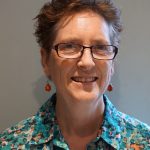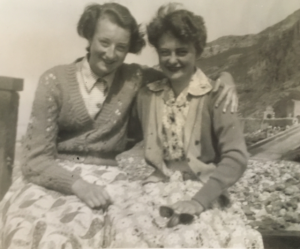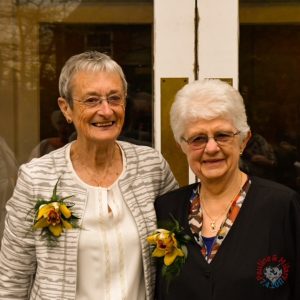Once I had a secret love
Whitman L (2023) Once I had a secret love. Journal of Dementia Care 31(5)22.
Pauline and Hilary Nowell talk to Lucy Whitman about the value of “rainbow” support groups for LGBTQ+ people affected by dementia
Since Pauline’s diagnosis with vascular dementia in 2019, she and her wife Hilary have received excellent personalised support from their local Alzheimer’s Society branch, and enjoy going together to Singing for the Brain, where they have always felt welcome. Nevertheless, Hilary says it was “life-changing” when they started attending the LGBTQ+ dementia support groups at Opening Doors London: the Speak Out with Dementia peer support group for Pauline, the Rainbow Carers Group for Hilary, and the Rainbow Memory Café which they attend together. Hilary says “the three different groups have all been vital to our own individual journey and acceptance. If we hadn’t had them it would have been like losing a limb.” Hilary insists “it’s hugely important for Pauline and me to be able to attend the Rainbow Memory Café as a couple. We feel comfortable amongst like-minded, helpful people, who have come together with mutual respect. In a gay group one feels safe and free to be able to discuss very personal subjects that others in the group know about and have experienced.” Pauline and Hilary have recently starred in an Alzheimer’s Society film about their enduring love, and their determination to support each other through the challenge of dementia. But for most of their life together they were not able to be open about their relationship. Now in their eighties, the couple met and fell in love as teenagers, in 1955, but parental pressure forced them apart, and Hilary got married and had two children. The marriage didn’t last, and Pauline moved in with Hilary and the children in 1971. This was a time when lesbians were not regarded as “fit” to be mothers, and many lesbians lost custody of their children. Pauline, who would eventually become a Director of Social Services, was the breadwinner, and would certainly have lost her job if her relationship with Hilary had become known. Pauline has enjoyed going to the Speak Out with Dementia group where she can socialise with other LGBTQ+ people who have a diagnosis of dementia. “And for me,” says Hilary, “attending the Rainbow Carers group is tremendously important: to be able to ask questions and learn from others who are on this same journey; to be able to open up about our fears and our feelings, and share each other’s ups and downs, not feeling we are alone on this journey. Our regular online meetings have created a unique bond between us.” Hilary found a “mainstream” carers group just didn’t hit the spot. “Having already had the experience of the Rainbow Carers group, where everyone is gay, I felt so awkward when I attended an online group where everyone else was heterosexual. I was immediately aware I was not able to be myself. It wasn’t for me, and I quit after one session.” After a lifetime navigating other people’s prejudices, and trying to keep yourself and your family safe from harm, it is not easy to drop your guard. To get the benefit of a dementia support group, you need to be able to talk openly about your life and about intimate matters. When you are feeling vulnerable, the last thing you want is to have to justify your identity and relationships, on top of having to deal with the challenges of dementia. After Pauline retired, and same sex marriage was finally legalised, Hilary and Pauline married in 2017. “We didn’t want a civil partnership, we wanted to be wife and wife,” says Pauline. Pauline and Hilary are convinced that being legally married makes a difference to how they are treated by health and care professionals. Gay couples often complain that their relationships are not regarded as equal to heterosexual unions: they may be perceived as “friends” or “sisters”, instead of partners in a permanent, loving relationship. “We immediately state our relationship to medical professionals, from the first introduction,” says Hilary. “It is so important to feel we can be open and accepted. It takes away that first barrier, to show that we are there for each other, whatever we are dealing with, and it makes it possible to concentrate on the matter in hand.” ‘Once I had a secret love’ has always been a favourite song, which Pauline still loves to sing. On their wedding day, the words finally came true: ‘But my secret love’s no secret any more.’ Watch the Alzheimer’s Society video about Pauline and Hilary https://www.youtube.com/watch?v=O0ORwQxQYMY Dementia support for people who identify as LGBTQ+ is available from: Opening Doors (formerly Opening Doors London): https://www.openingdoors.lgbt Brighton and Hove LGBT Switchboard: https://www.switchboard.org.uk Greater Manchester Age UK Bury: https://www.ageuk.org.uk/bury/our-services/gm-lgbtq-online-dementia-support-group/ Lucy Whitman was dementia engagement officer at Opening Doors from 2019-2022.
Lucy Whitman was dementia engagement officer at Opening Doors from 2019-2022.

